

|
Back to |
| The Front Page |
| News & Features |
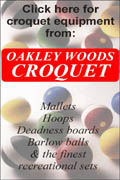
|
Croquet in Switzerland
happens mostly at CERN |
|
by David Underhill, with Bob Alman and Patrick Foy photos courtesy of David Underhill and Barbara Perkins layout by Reuben Edwards Posted May 17, 2013
|
The roots of croquet in Switzerland are firmly planted in the soil lying beneath the front lawns of the European Centre for Nuclear Research (CERN). Scientists at CERN have recently discovered the so-called God Particle, the practical consequences of which are assumed to be immense, though not immediately apparent. CERN was also the genesis of the World Wide Web, casually invented in 1989 as a byproduct of nuclear research, to help the scientists better keep in touch and exchange information. And it was here in 1964 that the first hoops were drilled into the ground and the first balls struck at the birthplace of Swiss croquet. It was here, in front of the restaurant, with CERN staff sipping their coffees and poring over reams of physics data, that the first hoops were run and the idea of a two-ball, three-ball and finally a four ball-break developed.
It was all thanks to an old croquet set brought out from England by Norman Eatough, taking up his appointment that year. On the occasional balmy evening, he carried the box out to the long-grass lawn and laid out the court; a game soon commenced. But the captive audience of early evening drinkers at the CERN cafe, many of whom had spent much of their day watching the minutest particles bouncing off each other, were not to be captured by the sport. Instead, they drank and watched the sun slowly set over the Jura Mountains.
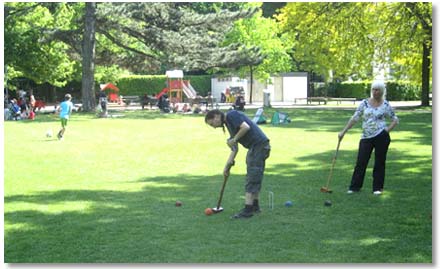
|
| The Zurich group typifies the state of croquet in most of Switzerland, mostly played on nine-hoop courts in public parks or their equivalent, as the central activity in a party setting. Note the one-handed grip, which allows the other hand to hold the beer. |
Neverthless, by 1982 more players were appearing on the courts and games were becoming a little more serious, so it was decided to form the CERN Croquet Club in May of that year, and thus acquire a more official status, including permission to mow and roll the croquet area to a more acceptable standard.
Club membership slowly increased as some non-CERN locals also took up the game, thus leading to increased competition within the club, while the nearest other formally organized club at that time was in Milan. On the 1st. of August 1991 the Swiss Croquet Association (SCA) was founded, coinciding with the 700th anniversary of the foundation of Switzerland.
So with more activity on the lawn a club hut in the form of an old cupboard was constructed under the overlooking tree. The club was now being noticed for possibly not all the right things, and although successfully resisting several attempts by top CERN management to remove the facility, finally in 1994 those responsible for the use of CERN facilities decided it was time for croquet to move to another location.
No croquet allowed here!
Would this be the end of croquet in CERN? No, it would be the rebirth of croquet in CERN and eventually the springboard for Swiss Croquet taking its place on the European and World scene.
In 1995 a new location was established, no longer on Swiss ground, but right across the border in France, and technically still on CERN territory. There was space for two lawns, and sufficient work was done on the courts to bring them up to a respectable, close-cut standard.
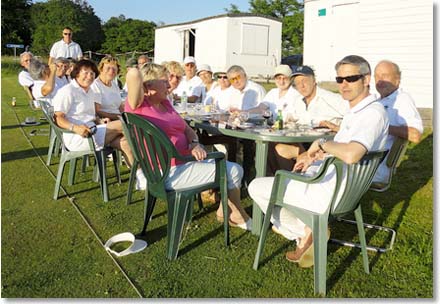
|
| The casual and collegial atmosphere of the club is evident at the 30th Anniversary Barbecue of 2012 outside the "cupboard" along the boundary of the two courts. When the weather is less sunny, the cupboard has just enough width to accommodate inside dining. |
The creation of the SCA as a national member of the newly-created and expanding European Croquet Federation opened up a whole new world of croquet clubs and players, as representative matches were set up against Ireland, England, Wales, Scotland, and, in the form of La Coupe des Alpes, against France and Italy. A little later, France dropped out (France is still a big hole in the European croquet map), Belgium took its place and now it’s La Coupe des Lacs, while Swiss players compete against Germany and Austria for the Rheingoldpokal.
Since 2002 the SCA has organized an annual Swiss Open croquet event for Association Croquet, attracting players from all over Europe, plus New Zealand and Australia. Unfortunately, the number of Association croquet players in Switzerland is not increasing as much as Golf croquet, and indeed is stagnating, so the senior members of the CERN club advocate more coaching of Association Croquet to remedy what they view as an imbalance.
In view of the influx of Golf Croquet players, a Golf Croquet International Event was organized in 2012, attracting a record entry for a Swiss competition of 28 players from all over Europe. It's to be repeated this year as the 2nd. Swiss Golf Croquet Open (21-22 September).
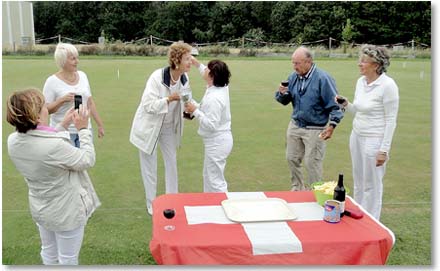
|
| Awarding the winner's cup at the 4th Women's Swiss Golf Croquet Championship, July 2012. |
Membership in the European Croquet Federation and later the World Croquet Federation (WCF) has provided Swiss champions with a welcome in European and World championships. That membership also permitted Swiss participation in the “affairs of state,” and Peter Payne, one of the best Swiss players, took up the post of General Secretary and then President of the European Croquet Federation and later became a member of the WCF Central Committee.
Individual Swiss players also participate in Championships outside the confines of Switzerland with some level of success. Ian Sexton, current No. 1 Swiss, won the Green Cup at the Irish Championships in 1991, and together with Peter Payne the Handicap Doubles, and more recently the first Mainland European Championship in Italy in 2008.
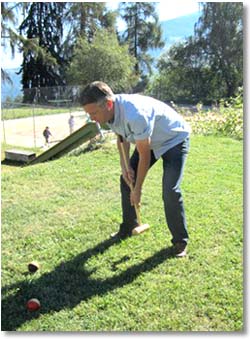
|
| Some 150 kilometers from Geneva, there is a spark of hope in the canton of Valais, where the municipality of Sion has promised land down in the Rhone valley to a local group who now play on a rude mountain meadow at 1400 meters by rules dating from visiting Brits in the late 19th century. Their better players have recently learned Association and Golf Croquet in Geneva. |
While the CERN Croquet Club and the Swiss Croquet Association have been the essential pillars on which Swiss Croquet has grown and developed over the years, in more recent times there has been a growth in cooperative activity with our croquet friends in Zurich, who play in a public park to a slightly more sophisticated standard thanks to the CERN influence. Not so in the Valais, where they are still limited to one fairly primitive annual tournament on the slopes of the mountainside at Mayens-de-Sion.
The Zurich group plays on Sunday afternoons and one weekday evening prior to retiring to the Outback Pub for a few drinks. Their fellow park companions give them a wide berth and respect their space, although the occasional ball may stray beyond their boundaries. Until recently they played by “garden croquet” rules but have since learnt the delights of Golf Croquet and say they'd like to learn Association Croquet as well. The Zurich players are experts at playing one-handed, with the mallet in one hand and a can of beer in the other, a hold they have successfully adapted to Golf Croquet, including jump shots; but they are slowly adapting to the more conventional two-handed grip.
The Zurich players have also become experts at Extreme Croquet: When it rains, they have discovered the pleasures of playing beneath the relative shelter of a nearby crop of trees.
What of the future of Croquet in Switzerland?
There is a steady growth in the number of our croquet players, most of whom prefer Golf Croquet. But moves are afoot to get them interested in Association Croquet, since fielding representative AC teams is still difficult.
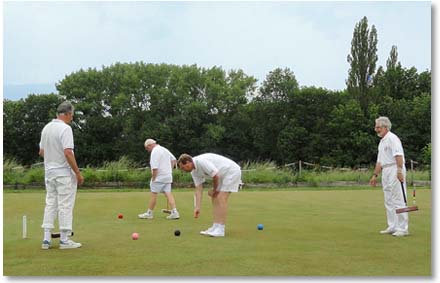
|
| The 2012 Coupe des Lacs (among Belgium, Italy, and Switzerland) was played in early June. |
The discovery of the “Toyman” making wooden croquet sets in the heart of the Jura mountains has created publicity in recent years with his “croquet games” at the Chateau de Prangins, and this year at the Palace Hotel in Gstaad. It's organized mostly for children, but plans are afoot to include the adults beginning in 2013.
There are also plans to take the game to local business and social associations exploiting the very “Britishness” of croquet--with such events as the Mad Hatters Tea Party for the Local Theatrical Club, and Afternoon Tea for the British expats society. And Gateball may be added to our “mallet” activities during the year, with an international gateball event set for September.
| 2013 EVENTS INVITING INTERNATIONAL VISITORS |
|
Swiss Open for Association Croquet 2-4 August at CERN in Geneva European Gateball Event with tuition and competition 7-8 September at CERN in Geneva Swiss Open for Golf Croquet 21-22 September at CERN in Geneva A visit to CERN is available for anyone attending any of these events. Limited accommodation maybe arranged with club members by request, while hotel accommodation can easily be found at reasonable prices. If you are interested in any of these events or anything within this article please contact: David.Underhill@cern.ch, President of the Swiss Croquet Association. |
Geneva, centrally located in the most international of European countries, has itself become almost a synonym for international peaceful cooperation. That spirit is reflected in the public spaces croquet-playing visitors like to see. Dave Underhill has invented a game around those spaces called, "Spot the croquet mallet."
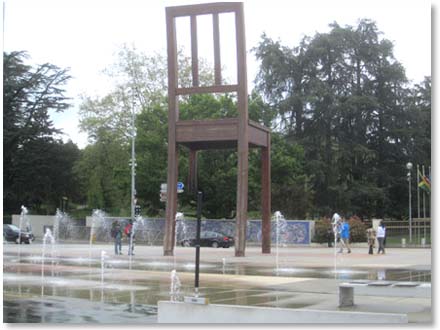
|
| This immense three-legged chair on the square in front of United Nations was created in recognition of those who have lost limbs due to Land Mines. |

|
| A view of Geneva Cathedral from a Lake Geneva marina. |
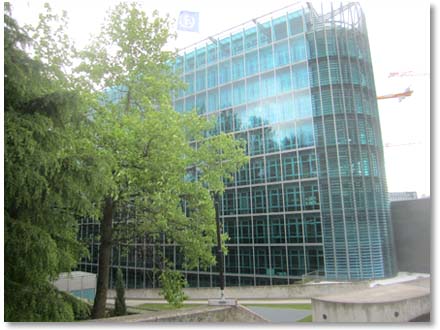
|
| The World Meteorological Organization. |
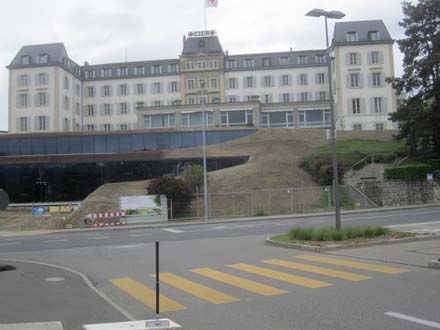
|
| The Red Cross headquarters. |
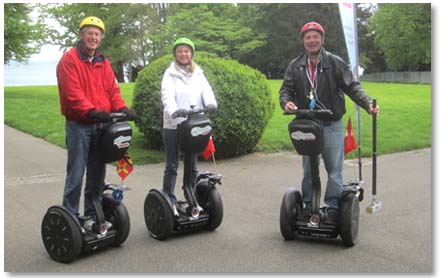
|
| Segway polo, anyone? (Clue: David Underhill is holding the mallet in this one.) |
Englishman David Underhill joined CERN in October 1966 and retired in 2010, though he continues to live in Geneva with his wife Vicky. He began with CERN in Computer Operations at a time when computers were essentially "mainframes"--big beasts which had to be fed paper tape and punched cards to receive instructions on what to do, read their data from tape reels, and store it on huge disks prior to spewing out the results on line printers, punched cards and paper tape. He graduated through the ranks to become Shift Leader, Section Leader and then Group Leader of the Central Computer Operations. In the more recent past David has taken a more active part in the area of User Services and since retiring continues on a voluntary basis as an Ambassador to the recently created Service Desk. He is one of a handful of European croquet players vigorously promoting the spread of Gateball through European croquet clubs, and he and his wife recently spent a few weeks in India coaching the re-establishment of regulation croquet in the subcontinent. It wasn't until one day in the late 80's that he discovered the croquet at CERN, driving past the lawns in front of the restaurant where they were then playing Norman Etough's game, and his life was permanently changed. As he puts it, "Croquet opened up, not just a new interest, but a whole new world, giving me the opportunity to visit countries and places I may never have visited otherwise, and to meet people I now consider as friends, spread all over the world. Croquet has become an integral part of my life and for that I am more than happy to give back to the sport whenever and however I can."